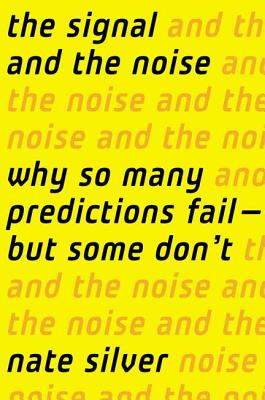
The Signal and the Noise: Why So Many Predictions Fail--But Some Don't
| Quantity | Price | Discount |
|---|---|---|
| List Price | $27.95 | |
| 1 - 24 | $23.76 | 15% |
| 25 - 99 | $17.33 | 38% |
| 100 - 249 | $16.77 | 40% |
| 250 - 499 | $16.21 | 42% |
| 500 + | $15.93 | 43% |
$27.95
Book Information
| Publisher: | Penguin Press |
|---|---|
| Publish Date: | 09/27/2012 |
| Pages: | 544 |
| ISBN-13: | 9781594204111 |
| ISBN-10: | 159420411X |
| Language: | English |
What We're Saying
Our business book bestsellers for the month of August, 2015 READ FULL DESCRIPTION
Over the course of this week, we will be posting the shortlist selections for our 8 business book categories: General Business, Leadership, Management, Innovation/Creativity, Small Business/Entrepreneurship, Marketing/Sales, Personal Development, Finance. Then on Monday, December 17th, we'll announce the category winners, and, on Wednesday, December 19th, we'll celebrate the overall winner of the 2012 800-CEO-READ Business Book Awards! Stay tuned. READ FULL DESCRIPTION
Amazon's editors have come up with another fine list of books this year. Their choices in the Business and Investing category are: The Power of Habit: Why We Do What We Do in Life and Business by Charles Duhigg, Random House Antifragile: Things That Gain from Disorder by Nassim Nicholas Taleb, Random House The Advantage: Why Organizational Health Trumps Everything Else In Business by Patrick Lencioni, Jossey-Bass Private Empire: ExxonMobil and American Power by Steve Coll, The Penguin Press Startup Communities: Building an Entrepreneurial Ecosystem in Your City by Brad Feld, John Wiley & Sons How Much is Enough? : Money and the Good Life by Robert Skidelsky and Edward Skidelsky Reverse Innovation: Create Far From Home, Win Everywhere by Vijay Govindarajan, Chris Trimble and Indra K. READ FULL DESCRIPTION
The season of lists is upon us. The first ornament up on the tree was Steve Coll's Private Empire: ExxonMobil and American Power, published by The Penguin Press, which took home the Financial Times and Goldman Sachs Business Book of the Year earlier this month. And there was another large nonfiction title related to economics—Why Nations Fail: The Origins of Power, Prosperity, and Poverty by Daron Acemoglu and James A. READ FULL DESCRIPTION
This morning I perused the Amazon Top 100 for 2012. A few of our favorite books that made the top 20: Nate Silver's The Signal and the Noise; Charles Duhigg's The Power of Habit (our JCS review here); and Susan Cain's Quiet (our take here. ) Rounding out the top 40 is a book that's been sitting on my desk for awhile, daring me to crack it open: Nassim Nicolas Taleb's Antifragile: Things That Gain From Disorder. READ FULL DESCRIPTION




